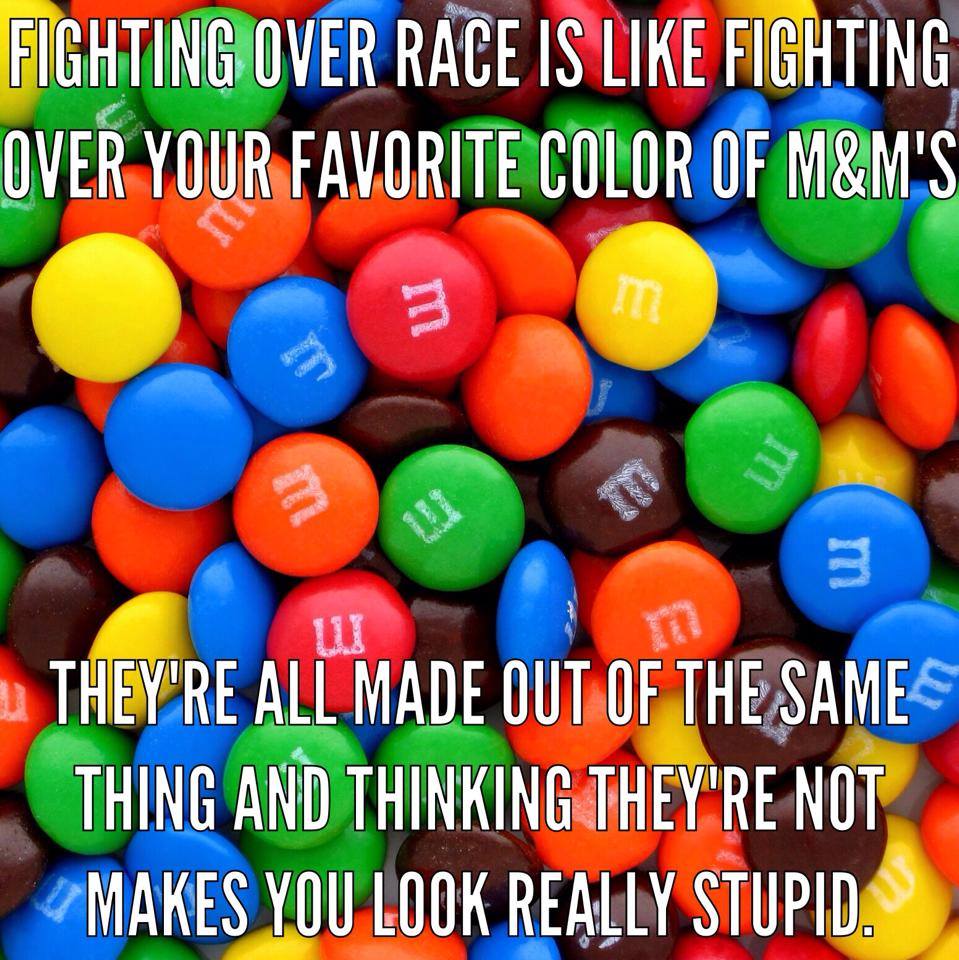I recently came across this meme on Facebook. Read it and ponder for a moment. What are your reactions to it?
Here is the thought process that went through my head when I read this:
– Fighting over race: I don’t see fighting happening over race. I see dialogue happening! Dialogue that is passionate can appear to be fighting. Ultimately, it depends on your perspective.
– Is this meme really going to compare people of different races to a sugary candy coated with dye? No, I’m sure they’re not, because that would be silly. Oh, my…yup, they sure are going there…
– They’re all the same thing: Well, if they chose to go there, then my response is that the meme’s author is in the minimization stage of intercultural competence. These universal values of “we are all the same” masks deeper recognition and appreciation of cultural differences and lies in the monocultural/ethnocentric mindset per the Intercultural Development Inventory, a widely used assessment tool for intercultural competence.
– Thinking they’re not makes you look really stupid: Hmmmm, that is pretty mean spirited and ignorant (meaning uninformed about a subject). I don’t think the IDI researchers would take too kindly to this final snarky line, not to mention the thousands of intercultural trainers (who tackle this topic in their life’s work!) that this meme would like to dismiss with an exclamation of stupidity.
Needless to say, this meme bothers me.
The challenge of discussing this meme with people who are in this stage of minimization (and coupled with our highly politicized environment in the US that seems to pit discussion about racist policies and practices with a war on police) is that people often can’t get past the emotion of the topic to deeply engage and truly listen. Our US culture doles out sound bites and prefers black and white statements about our society (pun intended) to deep, provoking thought and dialogue on difficult subjects that place us in the epicenter of our zones of discomfort. We don’t like to sit in the discomfort of hearing other perspectives because we are so clear on OUR values and OUR positions. Like minimization, we are in our mental zone and it is the ONLY one that matters at that moment. The average American is quick to dismiss dialogue on race as extreme liberalism at best or paranoia, at worst.
This saddens me.
Employers typically require dialogue and training around subjects such as diversity and multiculturalism, at least on the most cursory level, to avoid misunderstandings/lawsuits, and potentially to enhance productivity. Yet, how do we bring the average American to the table for this kind of conversation? We don’t. There is no requirement and little incentive for people to hear other perspectives when it comes to this topic, especially when we are so stuck in our white privilege to consider compassion for others who live in their daily reality of suffering. Our school systems are so focused on testing that there is little room for exploration of what it means to traverse a multicultural society.
Compassion is simply lacking, making dialogue on race feel like walking knee deep through a vat of honey.
A friend sent the video below to me and it is what I wish I could have shared with anyone reading and liking this type of mindless meme that compares colorful M&Ms to human beings. (I mean really, does the red M&M have a hard time catching a taxi in NYC? Has the blue M&M been humiliated in restaurants by wait staff who assume that they don’t have enough money to pay a bill (yes, this happened to two African American friends of mine in N. Carolina. They were taking a long time to order because they’re particular about what they eat and the waitress came over and told them they could share a plate “since they didn’t have enough money.” True story.) Has the orange M&M been profiled while driving a car or walking down a street? M&M’s are not people for goodness sake, and to make such a simplified version of how the world of race works in the United States by comparing race to colorful candy is a reflection of the lack of depth of inquiry for those who are sharing it.)
Anyway, back to this video! Vernā Myers is a diversity trainer who speaks to “How to overcome our biases? Walk boldly toward them.” In this compelling presentation, she talks about bias and how, by sitting in the discomfort of these, we can grow and engage in a meaningful way. The data about how we, as a people, feel about young black men in this country will astound you also. Please watch this video. It is what I would want to say to anyone who likes this meme that is floating around social media.
What are you biases? Do you regularly assess where you choose to immerse yourself?
I welcome your comments below!


